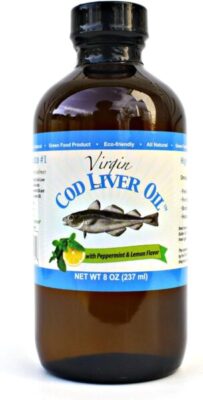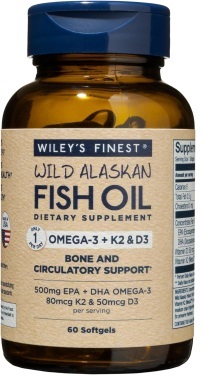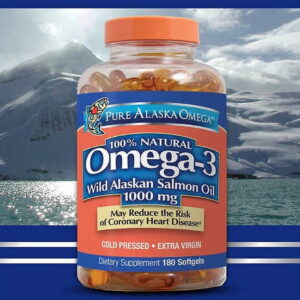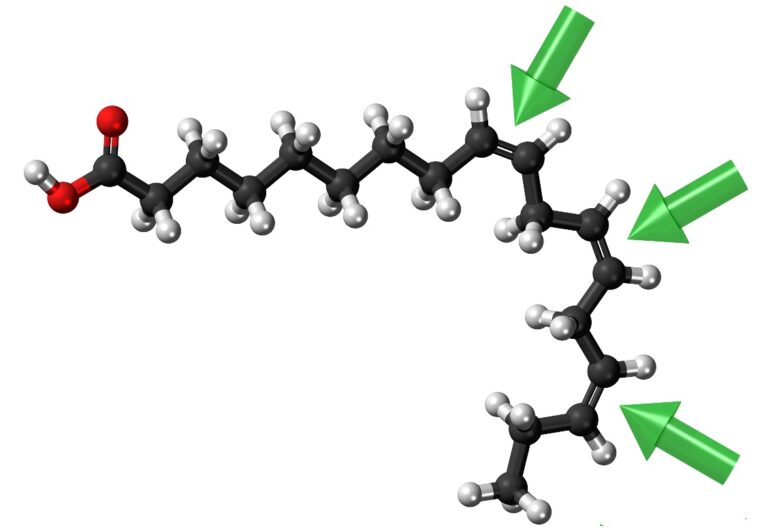
Antarctic krill oil for omega-3 EPA / DHA
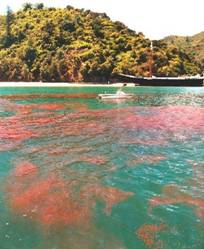
What are krill?
Krill are “shrimp-like” creatures (called euphausiids). These, so-called, zooplankton live in cold waters, primarily the Arctic and Antarctic, feeding mainly on microscopic phytoplankton (plant-life), such as omega-3-rich algae. E. superba species has a high omega-3 content in its oil – EPA: 15-21%; DHA: 9-14%.
Krill oil contains a synergistic balance of fatty acids, functional phospholipids and potent antioxidants.
A quality krill oil is cold-extracted whilst protecting the oil from light and air, preventing its oxidation, and preserving its nutrients. The process should not involve using solvents (e.g. hexane, acetone), which can leave traces of toxic residues behind after evaporation.
Krill are a better sustainable source for omega-3 than fish.
Health benefits of quality Antarctic krill oil
Canadian Neptune Technologies and Bioresources Inc. (now Neptune) used to be the frontrunners for krill oil, which they called Neptune Krill Oil (NKO™ ). Earlier studies supporting health benefits of krill oil used NKO™. More recently, the company made a decision to concentrate their oil using ACETONE as a solvent, which is NOT recommended here. Neptune’s new product is called NKO omega plus. Impressive health benefit studies using original NKO at bottom of page
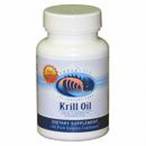
Naturally toxin-free
The krill species, Euphausia superba, used in KO lives in the clean waters of the Antarctic (although oil should still be tested for toxin-content). This krill species, like many others, moves upwards to the surface at night to feed on phytoplankton, before retreating downward to try to elude predators during the day.
Biblical instruction in the Old Testament warns against consuming “shrimp-like” creatures:
“Whatsoever hath fins and scales in the waters, in the seas, and in the rivers, them shall ye eat. And all that have not fins AND scales in the seas . . . they shall be an abomination unto you.”–
– Leviticus 11:9-10
Since Christ’s death on the cross, there is no longer a requirement for anyone to obey O.T. law, but it is in our interest to carefully weigh its merits. One important function of crustaceans is to remove toxins in the water ecosystem. However, similar to the pork and bacon issue, we need to wisely consider the conditions of the source. Most shellfish are harvested in coastal waters, which supply their diet of industrial deposits, sewerage, and fish excrement. If the krill oil is coming from uncontaminated waters and the oil is appropriately tested for toxins, the risk of consuming toxins should be null and void.
Krill oil’s main drawback in comparison to cod liver oil , is that it does NOT contain vitamin D. This important antioxidant is best obtained from sun exposure to bare skin, but if your area has insufficient sunshine in winter, you should take a high-vitamin cod liver oil in preference to krill oil.
Antarctic krill oil properties
40% of krill oil is in the form of beneficial phospholipids
Phospholipids are known as lecithin in commercial lingo. In the diet, they are predominantly found in eggs, lean meat, fish. The most common PL is phosphatidylcholine.
Phospholipids in krill oil have marginally better absorption rates than other oil forms, but have been shown to be more bioavailable as far as showing up in plasma and cell membranes. One 7 week study found that a 37% lower EPA / DHA dose from krill compared to fish oil achieved the same omega-3 plasma levels. Ulven et al, 2011. Another small, short-term study found that the bioavailability of omega-3 EPA / DHA from krill oil was greater than fish oil, but discovered that it was NOT due to the phospholipids. Kohler et al, 2015
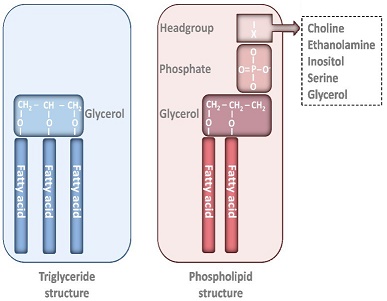
Phospholipids provide health benefits of their own by being a rich source of Choline. The most predominant phospholipid in krill oil is phosphatidylcholine, a potent source of choline. Numerous studies have demonstrated the importance of choline in brain development, learning and memory, and its particular importance for fetal and infant brain development. Choline is the precursor for the vital neurotransmitter acetylcholine (sends nerve signals to the brain), and for trimethylglycine (recognized liver protector). A shortage of acetylcholine has been associated with brain-related disorders such as Alzheimer’s disease and autism.
~60% of krill oil is in the trigyceride form (the predominant form in fish oil)
Naturally toxin-free
Krill are tiny, crustaceans that live in the frigid open waters of Antarctica, which are the cleanest waters on earth; Unlike prawns or shrimp, krill are not bottom-feeders, they feed on tiny plankton (microscopic plants and animals) which float on the ocean surface.
Krill oil contains lots of cell membrane protecting antioxidants
In direct ORAC (Oxygen Radical Absorbance Capacity) comparisons – milligram for milligram – the value of krill Oil was found to be 48 times that of fish oil and 34 times that of Coenzyme Q10.
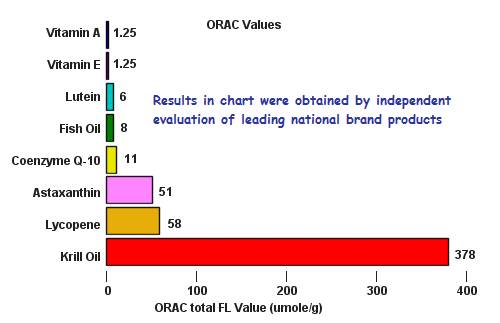
Natural, quality Antarctic krill oil contains vitamins A and E, and a small amount of the powerful and prized antioxidant astaxanthin. When present at > 200mcg astaxanthin/gram of krill oil, it can guard your cell membranes from free radical damage, help regulate inflammation, and protect against cataracts, age-related macular degeneration and sunburn; However, natural krill oil content is only about 100 mcg / gram, and its main benefit is to protect the oil iself from going rancid. Some manufacturers state esterified astaxanthin amounts, which includes the weight of the fat they are attached to and approximately doubles the true amount. SInce some krill oil labels list higher than natural amounts, it is assumed that they are adding astaxanthin for marketing purposes.
No fishy aftertaste or reflux
No adverse effects have been noted even at high dosages. Phospholipida disperse in water and so blend in with stomach fluids. In contrast, fish oil tends to stay floating on the top where it can “burp” back at you.
Krill oil is always taken in capsules. Prevents oxygen from damaging its polyunsaturated fatty acids; also you don’t have to taste the oil on the way down!
Unlike Cod Liver Oil, krill oil does NOT contain vitamin D
This important antioxidant is best obtained from sun exposure to bare skin. However, if you live in an area with insufficient sunshine in winter, you should supplement vitamin D3 (Vitamin D -“The Sunshine Vitamin”), or choose cod liver oil as your EPA / DHA supplement.
Recommended daily dosages of antarctic krill oil
1g krill oil – 2-3 times daily
Works best if taken in the morning. Taking it after noon may keep you awake.
Omega-3 fatty acids in krill oil. 1 gram (usually 1 capsule) contains ~120 mg EPA and ~60 mg DHA
Storage / Shelf-Life of NKO
Krill oil will last up to 2 years. Its own antioxidants acts as natural preservatives, making it more resistant to rancidity than conventional fish oils
Do not store it in the freezer or refrigerator. Extended exposure to temperatures higher than 100 degrees or lower than 50 degrees diminish effectiveness of the phospholipid ingredients.
Good brands of NKO
- Dr. Mercola Antarctic krill oil.
- Captain’s krill oil (pricey, supposedly small batch / fresh off the boat) krilloilcaptain.com
Neptune krill oil (NKO) ™ sponsored studies of health benefits using their original NKO
Canadian Neptune Technologies and Bioresources Inc. (now Neptune) were the frontrunners for quality krill oil, called Neptune Krill Oil (NKO™). Earlier studies supporting health benefits of krill oil used NKO. Various suppliers used NKO, with differences in how they package and deliver the oil. However, the more educated customer became savvy to NKO’s rather low EPA / DHA count, and the company made a decision to concentrate their oil using ACETONE. Neptune’s new product is called NKO omega plus.
Blood lipids, oxidative stress, inflammation
October 2010 Study showed that krill oil has effects similar to fish oil on serum lipids, oxidative stress and inflammation, but at lower dose of EPA and DHA
“A total of 113 participants … were randomized into three groups. Thirty-six were given 6 capsules of 3g krill oil a day, with 543 mg of EPA and DHA; 40 were given 3 capsules of 1.8g fish oil a day, with 864 mg of EPA and DHA … The remaining 37 received no supplementation … [T]here was a significant increase in plasma EPA, DHA, and DPA in both the krill oil and fish oil groups … and no significant differences were seen between the fish oil and the krill oil groups. The EPA + DHA dose in the krill was 62.8 % of that in the fish oil.”
Cholesterol / Heart Health Dramatically Improved with Krill Oil
Results were reported for the double-blind phase II clinical trial comparing NKO to high EPA/DHA fish oil and a placebo.
All subjects had diagnosed hyperlipidemia, a known risk factor for heart disease, and mild to very high blood pressure, with cholesterol levels of 194 – 348 mg/dL.
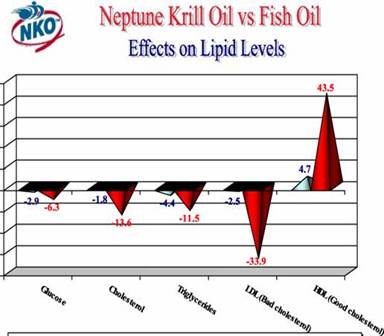
A multi-center, McGill University (Canada), 90-day, randomized study, followed by a 90-day, controlled follow-up of the patients in group B (see below). 120 men and women were randomly assigned to one of four 30-patient groups:
Group A – received krill oil at a body mass index (BMI)-dependent daily dosage of 2-3g daily.
Group B – were given 1-1.5 g krill oil daily + Follow-up of 500mg/day (1 softgel) for 90 days
Group C -was given a daily 3g dose of fish oil containing 540 mg EPA and 360mg DHA
Group D – was given a placebo containing microcrystalline cellulose
The study’s findings (published in Alternative Medicine Review in 2004):
(1) Krill oil is effective for the management of hyperlipidemia. By significantly reducing total cholesterol, LDL and triglycerides, and increasing HDL levels.
(2) At lower and equal doses of fish oil, NKO was significantly more effective than fish oil in managing lipidemia.
(3) Group that continued for 90 days with 1 daily 500 mg softgel for maintenance, cut their heart attack risk in half. After taking a maintenance dose of 1 – 500 mg softgel for a further 90 days, those in Group B saw their levels of artery-clogging LDL cholesterol plunge 44% and their triglycerides drop 20%, while levels of artery-clearing HDLs soared 38%.
BuneaR et al, Evaluation of the effects of Neptune Krill oil on the clinical course of hyperlipidemia
Quality of life study evaluated benefits of krill oil
This study further evaluated life qualities of the participants in Group A in the above cholesterol/heart study. Participants answered a 36-question standardized survey at the end of 30 days, 90 days, and 180 days. (Those with a BMI (body mass index) < 32 took 2 – 500 mg softgels daily; those with a BMI > 32 took 3 – 500 mg softgels daily for 90 days)
This survey measured patients’physical function, fatigue, pain, social function, emotional role, mental capacity, general health and physical appearance.The survey, in use since 1998 and published in over 4,000 different studies, was designed to provide statistically valid results.
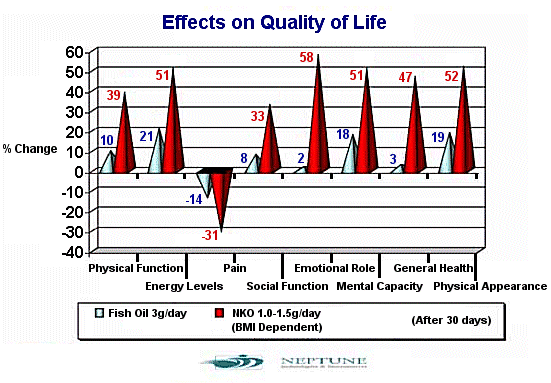
Physical Appearance
Subjects in the quality of life study (above) reported improvements in several physical attributes. An improvement in the look and feel of their hair, skin and nails, along with a 58% reduction in wrinkling, redness and other skin problems.
Woman’s World Magazine, The New Youth Preserver From Under the Sea, May 2004
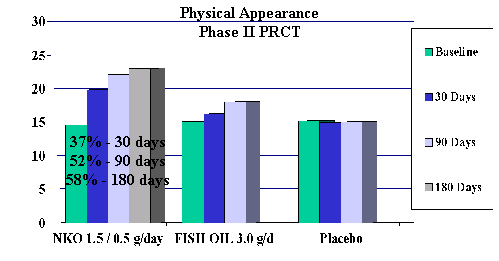
PMS
A double-blind, randomized clinical trial evaluated the effectiveness of NKO for management of premenstrual syndrome (PMS) and dysmenorrhea (painful menstrual periods) – concluded:
– NKO significantly reduced dysmenorrhea and the physical /emotional symptoms of PMS – significantly more effective than fish oil.
Fotini S. et al, Evaluation of the Effects of Neptune Krill Oil™on the Management of Premenstrual Syndrome and Dysmenorrhea
Arthritis
Study evaluated the effects of NKO on the biomarkers of chronic inflammation and the quality of life of 90 patients with arthritic disease – including rheumatoid arthritis and osteoarthritis. The results of this randomized, double-blind and placebo-controlled study positively indicated that 300 mg of Pure Krill Oil daily may, within 7-14 days:
(1) Alleviate symptoms caused by rheumatoid arthritis and osteoarthritis, including joint pain, stiffness and functional impairment.
(2) Significantly inhibit inflammation as shown by a decrease in C-Reactive Protein ( CRP – a biomarker for inflammation).
Study published in the February 2007 issue of the Journal of the American College of Nutrition
Skin cancer
NKO significantly prevented skin cancer induced by chronic exposure to UV radiation – according to results of a preliminary randomized and controlled 2002 animal study evaluated the effects of krill oil on UVB-radiation induced skin cancer in mice.
Autoimmune Disease
Study using mice, suggested that krill oil may delay the onset and progression of autoimmune disease (such as lupus) – study published in the journal Lipids in 1994, reported on research done at the University of Texas Health Center’s Department of Medicine.













